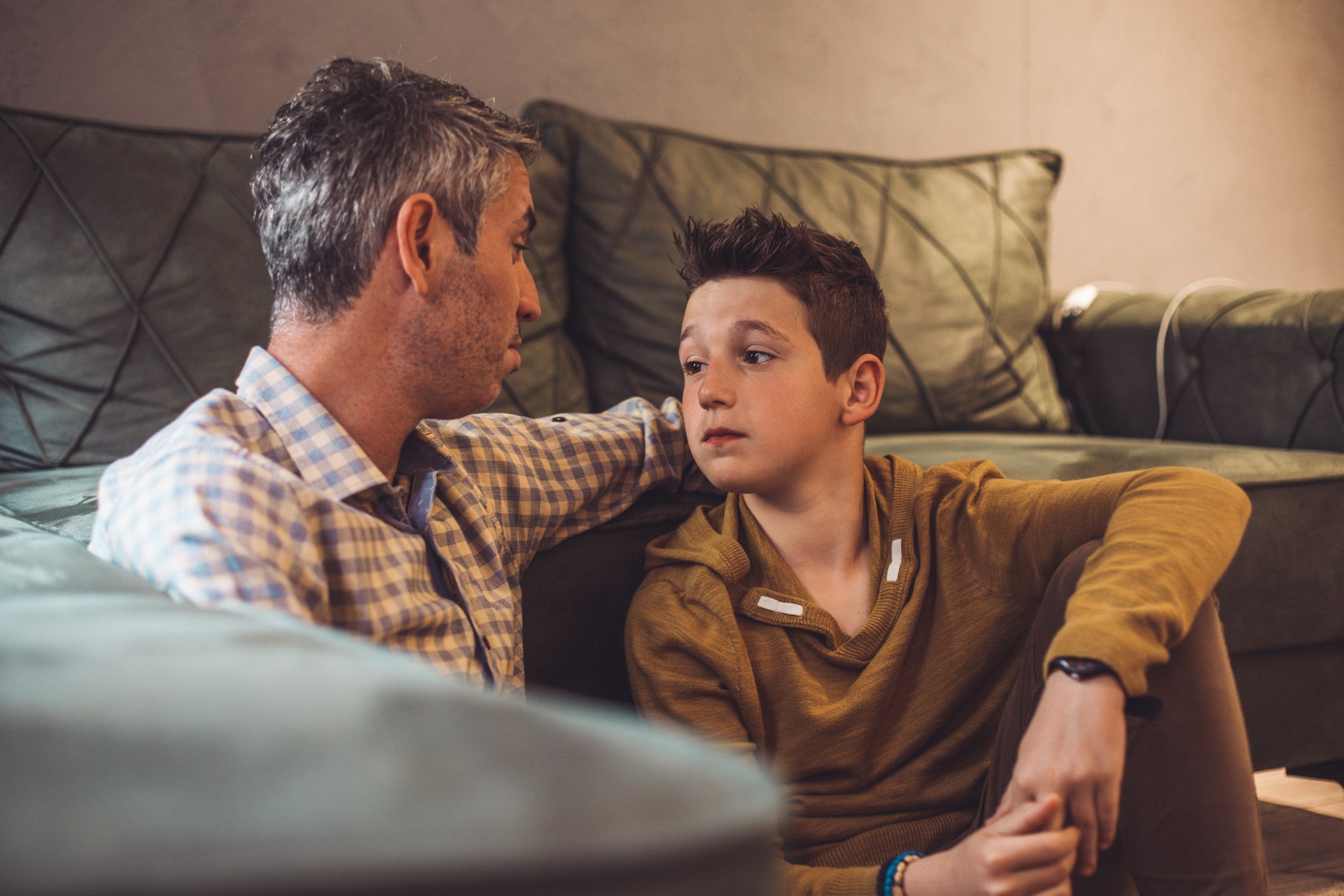How To Talk To Your Kids About Suicide (Age-by-Age Guide)

Every parent would like to believe that suicide is not relevant to them or their family or friends. Unfortunately, it’s all too relevant for all of us; suicide is the third leading cause of death among 14–18-year-olds.
In this article, learn why it’s important to talk about suicide and self-harm with your kids and how to broach the sensitive nature of this topic. We include specific tips from a Licensed Clinical Psychologist for having these conversations in an appropriate way depending on the child’s age.
Should You Talk to Your Kids About Suicide?
Yes, you should absolutely talk to your kids about self-harm and suicide. This is particularly important if your child knew someone who died by suicide, expressed suicidal thoughts or has been exposed to it in media and/or by friends. It’s something you CAN and SHOULD talk about with your children. Suicide prevention starts with a conversation.
Contrary to myth, talking about suicide CAN NOT plant the idea in someone’s head.
Instead, talking about the topic can open up communication about a topic that is often kept secret — and secrets that are exposed to the rational light of day often become less powerful. By talking about suicide, you also give your child permission to bring up the subject again in the future and prevent misinformation.
Dr. Stephanie J. Wong, Ph.D., Licensed Clinical Psychologist and Host of the Color of Success Podcast explained that kids are experiencing stress at unprecedented levels and from various sources.
“While issues such as bullying have always been an issue, add the vulnerability of being cyber-bullied. The risk of depression and suicide further increases for underrepresented individuals such as those who identify as LGBTQ+,” adds Dr. Wong.
Dr. Wong advises that family support and open communication can serve as protective factors against suicide.
Suicide Rates in Children and Teenagers
Suicide was the third leading cause of death among 14–18-year-olds in 2021 according to the Centers for Disease Control and Prevention.
The American Foundation for Suicide Prevention conducted a study that estimates that there were 100,000 suicides among adolescents aged 15 to 19 years between 1975 to 2015.
Suicide Rates in Teen Boys vs. Teen Girls
The suicide rate among teenage boys was significantly higher, ranging from 3 to 4 times that of teenage girls. This trend continues as kids enter adulthood as well. Adult males have overall higher rates of suicide than women with men roughly 4x more likely to die by suicide than women.
The suicide rate for boys showed a distinct pattern, with a peak occurring in the late 1980s and early 1990s, followed by a decline in the late 1990s and early 2000s. However, the suicide rate among teenage boys has been on an upward trend since 2006.
The suicide rate among teenage girls did not have this pattern; however, there has been a rise in suicide rates among adolescent girls over the past 10 to 12 years.
However, it's important for parents to talk to all children and teens about suicide.

Warning Signs of Suicide Parents Should Pay Attention To
The unfortunate truth is that suicide can happen to ANY kid in ANY family at ANY time. Therefore, it’s important to be aware of the risks of suicide. Here are some possible warning signs to watch for:
- STATEMENTS that convey a sense of hopelessness, worthlessness or preoccupation with death. (“Life doesn’t seem worth it sometimes.” “I wish I were dead.” “Heaven’s got to be better than this.”)
- BEHAVIORS that are different from the way your child acted in the past, especially things like talking about death or suicide, taking dangerous risks, withdrawing from activities or sports or using alcohol or drugs.
- FEELINGS that, again, seem different from the past, such as irritability, anxiety, sadness, hopelessness and loss of interest.
- SITUATIONS that can serve as ‘trigger points’ for suicidal behaviors. These include things like loss or death; getting into trouble at home, in school or with the law; or impending changes that frighten your child or make him feel unprepared.
If you notice any of these things in kids who have always been impulsive, who have made previous suicide attempts or threats or who seem vulnerable in any way, you really should get a consultation from a mental health professional.
Tips for Parents on Talking to Your Kids About Suicide by Age
So how do you deal with this reality?
The importance of mental health is as important as all other health and safety lessons you teach your child. Once you acknowledge that suicide is as much a risk for your child as not wearing a seat belt while driving, irresponsibly using alcohol or drugs or engaging in risky sexual behavior, you’ve taken the first step toward prevention.
You should already be talking to your children about the importance of taking care of their mental health (e.g. journaling, reducing stress, therapy) just as you talk to them about the importance of eating healthy foods or covering their mouth when they cough.
Remember: Talking to your kid about suicide will not make them suicidal.
If the discussion isn’t prompted by something your kid is saying or doing that worries you, approach the topic of suicide in the same way as other subjects that are important to you but may or may not be important to your child.
Timing is everything. Pick a time when you have the best chance of getting your child’s attention. Sometimes a car ride, for example, ensures a captive, attentive audience. A suicide that has received media attention can provide the perfect opportunity to bring up the topic.
Think about what you want to say ahead of time, and rehearse a script if necessary. It always helps to have a reference point: (“I was reading in the paper that youth suicide has been increasing…” or “I saw that your school is having a program for the teachers on suicide prevention”).
Here are some tips for talking to your kids about suicide for different ages.
How to Talk to 2- to 4-Year-Olds About Suicide
Keeping it simple and direct is key with younger children. Avoid giving too much information as they most likely won’t understand the concept of suicide and its permanence at this age; however, it’s crucial to emphasize that the loved one or family member died from an illness and that it is sad.
Avoid ambiguity and the use of euphemisms. For example, don’t tell them that the person went to sleep forever or that they have gone to a better place. Be direct. You can say, “Aunt Jane’s brain was very sick and the sickness took over. She died and it is very sad.”
Be sure to respond to any questions your young child may have with short and generalized answers. You don’t need to provide a full explanation. Let them take the lead with their curiosity.
How to Talk to 5- to 10-Year-Olds About Suicide

Dr. Wong explained that it is helpful for parents to set the foundation of open communication, including check-ins about their children’s feelings on a daily basis.
“Have general conversations about their friends and the things they liked and didn’t like about their day. Try to avoid only talking about feelings and suicide in reaction to something said or done by a child/teen,” advises Dr. Wong.
The best way to approach suicide with elementary school children is to be honest. If this is a hard subject for you to talk about, admit it.
For instance, you can say, “You know, I never thought this was something I’d be talking with you about, but I think it’s really important.”
By acknowledging your discomfort, you give your child permission to acknowledge his/her discomfort, too.
How to Talk to 11- to 13-Year-Olds About Suicide
With pre-teens, Dr. Wong emphasizes that caregivers should try to recognize any behavioral changes and signs of depression that may be occurring and truly try to understand their feelings.
For example, is your child more withdrawn? Are they showing less interest in school?
You could mention, “I’ve noticed that you seem a bit more quiet. I’m a little concerned.”
Don’t be afraid to ask your child directly. Some ways you could start the conversation:
“Are you thinking about suicide?”
“What do you think about suicide?”
“Is it something that any of your friends talk about?”
“The statistics make it sound pretty common. Have you ever thought about it? What about your friends?”
Listen to what your child has to say. You’ve asked the questions, so simply consider your child’s answers. If you hear something that worries you, be honest about that, too.
“What you’re telling me has really gotten my attention and I need to think about it some more. Let’s talk about this again, okay?”
Don’t overreact or under-react. Overreaction will close off any future communication on the subject. Under-reacting, especially in relation to suicide, is often just a way to make ourselves feel better. ANY thoughts or talk of suicide (“I felt that way a while ago, but don’t anymore”) should ALWAYS be revisited.
Remember that suicide is an attempt to solve a problem that seems impossible to solve in any other way. Ask about the problem that created the suicidal thoughts. This can make it easier to bring it up again in the future (“I wanted to ask you again about that situation you were telling me about…”).
How to Talk to Teens (13+) About Suicide
By the time your child enters high school, they most likely have dealt with stress and/or mental health problems. They may also have friends or people they know who have a mental illness.
This is the time to focus on ensuring your teen feels safe talking about their mental health, understands the importance of getting help and knows how to get support for their mental health issues.
Dr. Wong advises parents and caregivers should offer support, asking their teens what they need from them or how they could support them. Comfort and reassure them that there is help available and facilitate connection to help as quickly as possible.
“It is important to give them a safe space to talk about mental health, not shutting them down or immediately problem-solving,” adds Dr. Wong.
Suicide Prevention Resources for Kids and Teens
If you notice that your child is experiencing thoughts of suicide, depression or anxiety symptoms, it’s crucial to get professional help immediately.
Consult with your child’s doctor or pediatrician for mental health treatment.
Call 988 for the 988 Suicide and Crisis Lifeline to speak with a trained counselor if you or your child is experiencing a mental health crisis
The Trevor Project crisis line is an excellent resource for LGBTQ+ youth in crisis.
Text the Crisis Text Line by texting ‘TALK’ to 741741 for guidance on the most appropriate next steps and resources.
If your child is a threat to themselves or others, please call 911.

